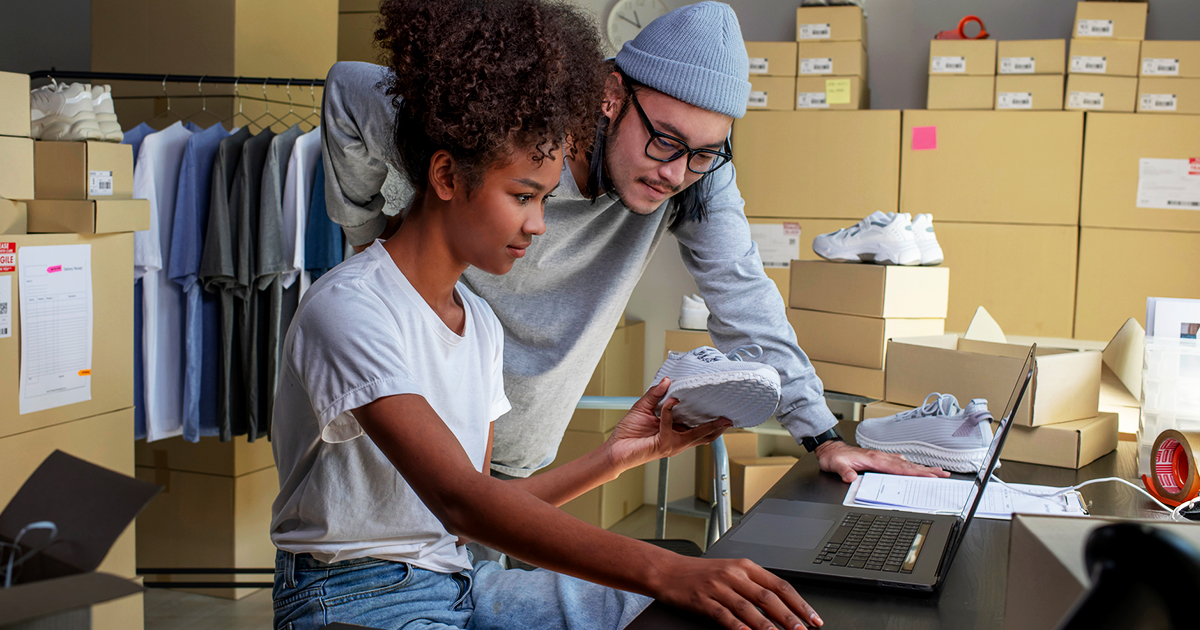2024 ecommerce trends are only starting to pop up. What’s the overall forecast for this year? Businesses right now can fine-tune, set standards, and even try something new to unlock great potential.
At Sendle, we’re all about looking ahead to make sure small businesses are set up for success. And while it’s still early into the year, there are already a lot of opportunities for small businesses to gain a competitive edge. Hey, maybe this will be the year that you start your YouTube channel!
We don’t expect small businesses to become Mr. Beast-equivalents or viral TikTok sensations overnight – so YMMV. But there are tell-tale signs of trends that are worth keeping in mind, including ones popping up in social media, small business shipping, and more.
How did ecommerce do in 2023?
If one word can describe the past year, it would be “flexibility.” 2023 had been full of uncertainties, and we probably don’t have to tell you that twice. There was a fair share of ups and downs, but regardless, small businesses continue to persevere.

We knew it would take more than rumors of a recession or the threat of an AI takeover to discourage small businesses from succeeding. Last quarter, U.S. ecommerce sales alone reached $21.7 billion. A nearly 8% increase since 2022 – and that was only a few months ago!
Does this mean that ecommerce will continue to soar? That inventory will be flying off shelves and trucks will be careening down Rainbow Road?
It’s hard to say right now, but let’s put it this way. If a word may summarize 2024, it’s “potential.”
Just hear us out.
What does 2024 have in store for small businesses?
While last year had a lot of question marks, it taught us that being aptly prepared to weather a storm – like diversifying shipping carriers – pays off in the long run. We can bet that 2024 will be similar and see small businesses needing to adapt, improvise, and overcome, but in ways we might not expect at the get-go. Ready to get TikTok famous?
We kid (though we’re not saying you shouldn’t!). So that brings us to the main course. Below are six thought-starters for small businesses to noodle on about possible 2024 ecommerce trends. We also tapped our wonderful partners to share their predictions about what might make waves in the ecommerce industry this year.

1. Peak season may start even earlier than it did in 2023.
Sorry for the jump scare, we know a lot of small businesses are pretty fresh off of peak season. But since last quarter’s U.S. ecommerce sales contributed to total retail sales reaching $1.267 trillion, we can expect for this year’s season to hit similar numbers.
Jonathan Witt, Sendle’s Senior Partnerships Manager, suggests that shoppers will add to their holiday carts as early as this October. “It was interesting to see businesses and consumers shop more in the month before Black Friday and Cyber Monday (BFCM). Businesses started their sales early and consumers took advantage of early deals before the holidays and rush of the typical BFCM season.”
Witt also predicts how businesses may have to adjust their sales strategy leading up to ecommerce’s busiest time of the year. “Like 2023, I think we’ll see a similar trend with consumers waiting until these larger sales to make their purchases. With the high-interest rates and cost of most goods rising, consumers are more likely to hold off on purchases until there’s a sale.”

2. Brick-and-mortar stores will see a revival.
The nostalgic renaissance doesn’t only apply to music and movies (looking at you, Mean Girls reboot). As our regular routines make a more sure return to normalcy, shopping in-person at retail stores may see a significant resurgence since 2020. Why not grab a little treat while you’re out and about, right?
“Don’t get me wrong, online sales are still growing at a steady pace but there are some consumer goods categories that shoppers still love to go into a physical store for,” Witt explains. Businesses that have both an online and IRL presence can further lean into the latter if they hadn’t in the years prior.
“Businesses should look at utilizing their physical store as a fulfillment location. If fulfillment is doable in-house, gather online sales from your ecommerce platform, marketplace, or whatever sales channel you sell on and fulfill the orders right from the store location.”
3. Diversify, diversify, diversify your shipping carriers.
Did we mention carrier diversification earlier? Sure, it may not sound very glamorous, but it’s making a big splash in ecommerce for a reason. “Carrier diversification has been a big topic over the past few years. It will continue into 2024 to allow businesses to find the best rates and services for their shipments,” Witt supplies. “Carrier diversification allows a business to select the best carrier or service for each shipping lane.”
“It also mitigates putting ‘all your packages in one basket’ if there are service disruptions or delays with one carrier,” Witt says. And for good reason, as the industry narrowly avoided the negative effects that would’ve come from a massive UPS Teamsters strike.
Having more options can help you continue doing business as usual, and give your customers extra assurance when these kinds of situations happen. “Businesses can easily pivot and switch to another carrier they frequently use.”
4. TikTok Shop is stealing the spotlight.
Gen Z has made it clear that they’ll keep tuning into TikTok for the latest music, memes, and of course, shopping. Shoppers can find all their fan-favorite items, from the fireproof Stanley cup to Summer Fridays lip balm, and check out their carts right in the app. More importantly, the rising popularity of TikTok Shop is a nudge for businesses to log in and meet customers where they are online.

Max Baehr, Partnerships Manager at Easyship, predicts that buying items from a business’s TikTok Shop will quickly become a norm for many American and Canadian consumers. "We see TikTok Shop on track to gain significant momentum this year. It has paved the way for a fresh wave of entrepreneurs and consumers, tapping into their preferred online spaces and delivering a new purchasing journey. Since integrating with TikTok Shop last year, we have been blown away by the activity.”
The good news is, that you don’t have to be a TikTok pro to begin selling on the fifth most popular social media app. Shipping solutions like Easyship and affordable services like Sendle can help small businesses keep up with demand without sacrificing more costs. “Partners such as Sendle have played a crucial role in addressing the escalating demand from burgeoning brands within this ecosystem,” Baehr says.
5. Our unhealthy relationship with returns hurts businesses and the planet.
How often do you make an Amazon or Costco return in a month? According to Statista, returned merchandise in 2023 amounted to approximately $248 billion U.S. dollars. Everyone’s probably got a growing pile of returns in a corner that’ll totally, definitely get taken care of tomorrow, for sure (Spoiler alert: the pile continues growing).
Jim LeRose, CRO at Ordoro, a leading inventory, shipping, and dropshipping management SMB software solution, points out that while we’ve quickly gotten used to making swift returns with a tap on a phone, there’s a not-so-hidden cost that comes with that ease.
LeRose predicts “In 2024 the value of all ‘returned’ product value will exceed the GDP of 193 countries.” “I’ll put it another way: only about 20 countries have a higher GDP than the value of all items expected to be returned in the USA in 2024. This is causing economic catastrophe for small businesses and is increasing the speed of climate change.”

It might sound great that making a return is so quick and simple that it’s almost like a sixth sense, but our environment suffers from the unprecedented, climbing number of returned goods.
“This is a problem that won’t be easy to address as long as giant behemoth organizations set extraordinarily simple return policies that essentially encourage returns. While these policies help build brand loyalty to the Amazon’s of the world, they hurt small businesses.”
“Consumers have lost sight of this due to the conveniences offered but there is an extreme contribution to carbon in our atmosphere,” LeRose summarizes. “2024 will be the start of the recognition that this problem must be reigned in for both economic reasons and to help slow the speed of climate change.”
Making necessary returns isn’t inherently a bad thing, but reversing what’s become an unsustainable consumption habit may take a bit of persistence from businesses that will need to set an example for ecommerce and consumers alike. That, in itself, is a major opportunity for you to stand apart from the competition and show that doing business, taking care of each other, and improving our impact on the planet aren’t all mutually exclusive.
6. Optimize and automate to focus on what matters.
Okay, maybe the near future isn’t full of Blade Runner replicants to handle our grocery runs. However, the rise of AI and machine learning has revamped the conversation around efficiency. Already, we’re seeing processes improve with the addition of digital tools, helping business owners focus on the important things. Like staying committed to their products, customers, and mission statement.
Madison Unruh, Marketing Manager at Ordoro, is enthusiastic about how businesses can better optimize with a little extra, non-human help. “In 2024, it’s common knowledge that ecommerce merchants barely have a moment to catch their breath, let alone devote every waking hour to planning how to grow their business. Their plates are full of the endless whirlwind of running their business and tackling the never-ending to-dos.”

“But this year, I predict ecommerce merchants are reclaiming their precious time with software tools.”
“Whether it be by utilizing AI to reduce writer’s block for email campaigns, implementing inventory management software to ensure full visibility into their stock and demand, utilizing QuickBooks Online to streamline their accounting tasks, or bundling up all their shipping, inventory, and dropshipping chores under one order management software (like Ordoro) — the list is endless!”
We’ve also got a good feeling about this year being one full of fast growth for businesses. And only in the best of ways, thanks to automation and smart integrations freeing up your hands a bit more. “2024 is shaping up to be the year of efficiency — embracing tools that allow merchants to simplify the daily grind and get back to scaling!”
2024 is already looking brighter.
Feeling fired up to make 2024 your best year yet? Good. The proof is in how, despite some of the daunting circumstances that ecommerce as a whole faced during years prior, there’s now an ocean of potential ahead. And you’ve got Sendle and our partners right there with you, to help your business go even further.

